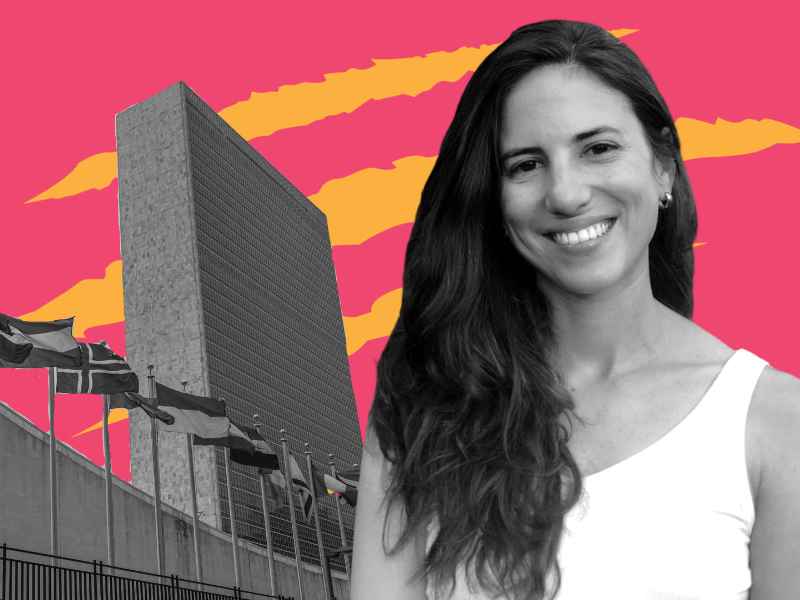CESR's lawyer comments on the international discussion to move the international taxation talks from the OECD to the UN. According to several countries in the Global South, the "Inclusive Framework on BEPS" does not follow an inclusive process and is ineffective in meeting Global Human Rights and environmental commitments.
This year, the 78th session of the UN General Assembly had a renewed call to reform multilateralism and demand more commitment from developed countries to deliver on promises and duties related to today's global challenges. Among these calls to change the status quo, the Second Committee of the General Assembly is studying and debating the Report of the Secretary-General on promoting inclusive cooperation, which calls for the creation of effective international tax rules.
This discussion has gained international interest as it could lead to the creation of a multilateral convention on taxation. The proposal has invigorated criticism against the OECD/G20 Inclusive Framework on BEPS, as it is a process that has not been inclusive and ineffective in addressing global challenges such as inequality, digitization of the economy, and the climate crisis. In this regard, several countries of the Global South are calling for a global regime that allows States to mobilize sufficient resources to guarantee human rights and the commitments of the Sustainable Development Goals.
Thus, since October, the Second Committee has been holding discussions to submit a draft resolution to the General Assembly in November to follow up on the process. To understand the magnitude of the developments, the Human Rights in Tax Policy Initiative spoke with CESR attorney and consultant Olivia Minatta, who detailed the details of the future of this potential Convention and its importance for low- and middle-income countries.
Initiative: Who benefits from the lack of global taxation? Under what mechanisms?
OM: The need for global taxation rules has to do with how multinational companies currently operate. These entities carry out their economic activity —the production and sale of goods or services— in different countries simultaneously, through subsidiaries or companies belonging to the same group. Because of this activity in these sovereign territories, several countries consider having taxing powers over such entities beyond those where they have their main offices.
However, companies are looking for ways to pay as little tax as possible. They use different legal strategies to take advantage of the regulatory vacuum that exists at the global level, or they abuse double taxation treaties or the existence of tax havens. A common practice is, for example, profit shifting, transferring profits from one jurisdiction to another, often tax havens or countries where they do not have economic activity, to avoid taxation in the jurisdiction that imposes a higher tax burden but where they carried out the economic activity.
Due to the lack of international regulation and intending to attract multinational investment, countries establish different regimes that grant meaningful tax benefits, known as the "race to the bottom." It is a struggle between countries to attract foreign investment by creating more and more exemptions —although there is no conclusive evidence to know whether these regimes are effective in promoting investment.
All this, not to mention the digitalization of the economy, which has allowed companies to transport Capital, and offer products and services in several countries without having any physical presence there. A practice that hinders countries from adopting effective tax policies based on their tax frameworks.
Initiative: Who is interested in creating a global tax mechanism?
OM: Certainly, the countries that perform as tax havens are the least interested. Among them, we find not just the Caribbean islands but rich countries such as Luxembourg and Switzerland. On the other hand, there are countries that, although they are not tax havens, oppose because they are home to the headquarters of multinational companies, as is the case with the United States. European countries have adopted ambivalent positions, as they agree to create this mechanism; nonetheless, it seems they will oppose any effort at the UN, arguing that a new process would be "duplicating" efforts with the OECD framework.
But, beyond that, there is a consensus to have an international tax coordination and cooperation system. The problem is that this system started to be negotiated in the OECD in 2013 and resulted in the Inclusive Framework on BEPS that, as I mentioned, is considered ineffective by most poor and middle-income countries to address their respective problems.
The OECD system consists of two pillars of global taxation. The first pillar seeks to distribute the taxable profits by considering not solely the place of tax residence but also the places where they carry out their economic activity. The second pillar consists, among other things, of creating a minimum taxable base to prevent countries from persisting in the race to the bottom.
This framework is identified as a problem, not because it does not pursue a laudable objective, but because, as the UN Secretary General's report details, its elaboration was not very inclusive and, therefore, did not provide answers to the objections raised by several countries that would be affected by its rules. Even when the number of countries participating in the OECD negotiations expanded in 2021, these countries could not vote or influence the discussion of some agenda items. Therefore, many countries in the Global South and some independent estimates have stressed that applying these rules would not benefit them.

Initiative: In the first two cases, binding conventions, how could they change the rules of the game?
OM: In both cases, there would be a more inclusive process for negotiating international tax regulations since it would take place in the framework of the General Assembly, where all countries discuss and vote on an equal footing. If the third option is approved, it could mean that, in practice, the OECD system will prevail.
In terms of substance, there are still no concrete discussions in the General Assembly sessions. But this new regime would seek a simple way for taxing companies according to the economic activity they carry out and not only according to their tax domicile. Another remarkable consequence would be to set a higher taxable minimum than that proposed by the OECD, once again, to discourage the race to the bottom and the search for tax havens by companies.
Initiative: If a mechanism such as a UN-based Convention materializes, what would be the role of regional platforms such as the Africa Group or the recently created Regional Tax Cooperation Platform for Latin America and the Caribbean?
OM: It seems to me that they have a vital role, from a political and technical point of view, to produce evidence. These platforms and discussion forums have to do with being united, with common positions in the face of global discussions. For example, although countries may have disagreements, Africa and Latin America share several problems, such as a low tax burden on corporations, very high inequality, and high dependence on some industries. The idea is that these discussions should be dealt with jointly because many of these are not problems that affect OECD countries.
The case of the Africa Group demonstrated this. They passed a resolution at the UN because they worked together. But if it had only been Nigeria, it might not have made it. Because that's an additional thing, many countries have incentives to negotiate individually, for example, accessing the OECD. But if you act as a bloc, it is more difficult for developed countries to co-opt developing countries.
Initiative: How can a future Convention be aligned with the new challenges, especially in the gender and the environment agendas?
OM: Everything has to do with the fact that we need resources to implement affirmative policies for vulnerable groups and so for environmental and climate policies. However, this discussion takes place in a broader context, in a debate about the current global financial scheme. The discussion comprehends several rules related to commerce, investment, and, among them, the rules on international loans, the financing of States, International debt, and the role of multilateral credit banks.
There is a consensus that all of this has to converge with the Sustainable Development Goals (SDGs) and Human Rights commitments. The General Assembly has urged to move forward with the SDGs because only 15% are underway. And one of the main reasons they are not advancing is because there are no resources. Many countries have an enormous debt crisis, worsened after the pandemic. So, this possible Convention is part of a process to rewrite the international financial rules to achieve global equality.
Initiative: What discussions have taken place within the UN? Which are still pending?
OM: At the beginning of October, the sessions of the Second Committee of the General Assembly began, where the Secretary General's report, which we have already mentioned, was presented. Now, the countries are preparing their delegations and positions on the subject. These weeks are the informal sessions, with an expected proposal for a resolution by the African Group over the follow-up on the previous resolution and to continue with this process. The vote by the General Assembly will take place in November. After that, we will see if this initiative has continuity and how.










